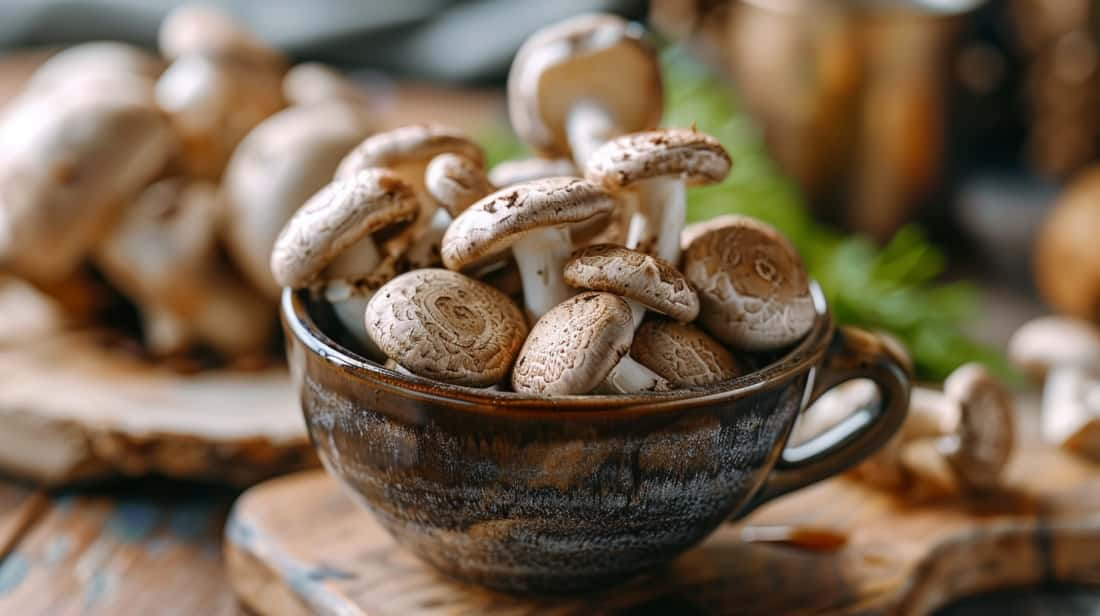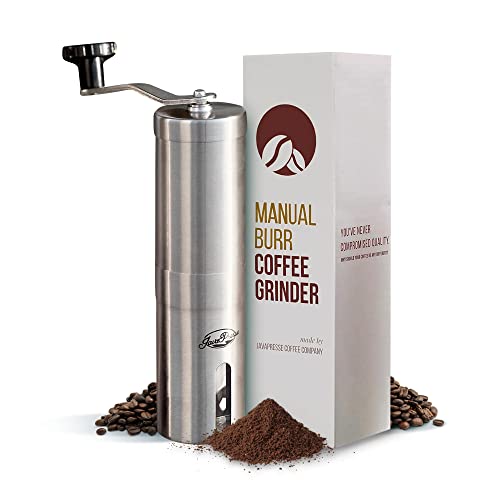Coffee Alternatives And Tea
What Is Grain Substitute Coffee

As someone with a passion for coffee, the concept of discovering a substitute for my daily brew has always fascinated me. You can imagine my thrill upon uncovering a wealth of options that not only present distinct taste experiences but also come with numerous health advantages.
In this article, we’ll delve into the fascinating realm of grain substitute coffee, exploring its various types, how to make it, and its potential impact on our well-being. Get ready to embark on a journey of discovery and expand your coffee horizons.
Key Takeaways
- Grain substitute coffee has reduced caffeine content compared to traditional coffee.
- Grain substitute coffee is rich in antioxidants, promoting overall health and well-being.
- Grain substitute coffee has lower acidity, reducing digestive issues.
- Grain substitute coffee is a more sustainable choice, requiring less water and resources and producing less waste during production.
Benefits of Grain Substitute Coffee
The benefits of grain substitute coffee are numerous. It offers both reduced caffeine content and potential health advantages. One of the main health benefits is the lower caffeine content compared to traditional coffee. This is especially beneficial for individuals who are sensitive to caffeine or those looking to reduce their intake.
Additionally, grain substitute coffee is often rich in antioxidants, which can have a positive impact on overall health and well-being. Moreover, this alternative coffee option is also known for its lower acidity, making it gentler on the stomach and potentially reducing digestive issues.
From an environmental standpoint, grain substitute coffee has a lower impact compared to traditional coffee production. It requires less water, fewer resources, and produces less waste, making it a more sustainable choice for coffee lovers.
Types of Grain Substitutes for Coffee
One popular option for replacing traditional coffee beans is using a different type of grain alternative. There are several different types of grains that can be used as substitutes for coffee beans, each with its own unique flavor profile.
One such option is barley, which has a mild and nutty flavor. Another option is rye, which has a rich and earthy taste. For those looking for a caffeine-free alternative, chicory root is a great choice, as it has a slightly bitter and roasted flavor.
These grain substitutes offer a diverse range of flavors, allowing coffee lovers to explore new tastes while still enjoying their favorite beverage.
Now that we know about the different types of grain substitutes, let’s move on to how to make grain substitute coffee.
How to Make Grain Substitute Coffee
As a coffee enthusiast, I’ve explored the world of grain substitutes and discovered the numerous benefits they offer.
Not only do grain substitutes provide a rich and flavorful alternative to traditional coffee, but they also come with a range of health benefits.
Some popular grain alternatives include barley, corn, and chicory, each offering its own unique taste and aroma.
When it comes to brewing techniques, experimenting with different ratios and brewing methods can help achieve the perfect cup of grain substitute coffee.
Benefits of Grain Substitutes
There’s no denying the benefits of using grain substitutes in coffee. As a coffee enthusiast, I have explored various brewing methods and their impact on the environment. Here are four reasons why grain substitutes are advantageous:
-
Environmental impact: Grain substitutes, such as barley, are more sustainable than traditional coffee beans. They require less water, land, and energy to produce, reducing the carbon footprint associated with coffee cultivation.
-
Health benefits: Grain substitutes offer a healthier alternative to regular coffee. They are gluten-free, lower in acidity, and can be easier on the stomach, reducing digestive issues commonly associated with coffee consumption.
-
Unique flavors: Grain substitutes add a distinct flavor profile to coffee, providing a new and exciting experience for coffee lovers. They can offer nutty, malty, or even chocolatey notes, enhancing the complexity of your brew.
-
Versatility: Grain substitutes can be used in various brewing methods, including pour-over, French press, or even espresso. This versatility allows coffee lovers to experiment and customize their brewing routine to suit their taste preferences.
Overall, incorporating grain substitutes into your coffee routine not only benefits your health but also supports a more sustainable and diverse coffee industry.
Popular Grain Alternatives
If you’re looking for a unique twist in your morning brew, popular alternatives like barley and chicory can add exciting flavors to your cup. Grain substitutes offer a wide array of benefits, including dietary advantages and unique taste profiles.
Barley, for instance, is a great source of fiber and can help regulate blood sugar levels. It also adds a nutty flavor to your coffee.
Chicory, on the other hand, is known for its rich, deep flavor that complements the bitterness of coffee.
To brew these substitutes, you can use a similar technique as regular coffee. Simply grind the grains or chicory root into a fine powder and mix it with hot water. Let it steep for a few minutes, strain, and enjoy your delicious and nutritious cup of coffee with a twist.
Brewing Techniques for Substitutes
To brew these alternatives, simply grind the grains or chicory root into a fine powder and mix it with hot water.
Here are the best brewing methods for grain substitute coffee:
-
French Press: Use a coarse grind and let it steep for 4-5 minutes before pressing down the plunger.
-
Pour-Over: Place the coffee grounds in a filter and slowly pour hot water over it in circular motions.
-
Aeropress: Add the coffee and hot water to the chamber, stir, and press it through a filter.
-
Espresso Machine: Use a finely ground powder and brew it under high pressure for a concentrated shot.
These methods require different brewing equipment like a French press, pour-over cone, Aeropress, or espresso machine. Experiment with these techniques to find your preferred brewing method for grain substitute coffee.
Now, let’s explore the health effects of grain substitute coffee.
Health Effects of Grain Substitute Coffee
When considering the health effects of grain substitute coffee, it’s important to examine the nutritional benefits it offers.
Grain substitutes, such as barley or chicory, can provide essential vitamins and minerals that are not found in traditional coffee.
However, it’s also crucial to consider potential side effects, such as digestive discomfort or allergic reactions, that may occur with the consumption of these substitutes.
In comparison to traditional coffee, grain substitutes can offer a healthier alternative with added nutritional value, although individual tolerance and preferences should always be taken into account.
Nutritional Benefits of Grain Substitutes
You can enjoy the nutritional benefits of grain substitutes by incorporating them into your diet. Grain substitutes offer a healthier alternative to traditional grains and can be used in various recipes, including baking and cooking.
Here are four key benefits of using grain substitutes:
-
Increased Fiber: Grain substitutes like almond flour and coconut flour are rich in fiber, promoting healthy digestion and aiding in weight management.
-
Lower Carbohydrates: Many grain substitutes have lower carbohydrate content than traditional grains, making them suitable for low-carb or ketogenic diets.
-
Higher Protein: Some grain substitutes, such as quinoa and amaranth, are excellent sources of plant-based protein, providing essential amino acids for muscle repair and growth.
-
Gluten-Free Options: For those with gluten sensitivities or celiac disease, grain substitutes like buckwheat and millet offer gluten-free alternatives for baking and cooking.
Potential Side Effects
If consumed in excessive amounts, some grain substitutes may cause digestive discomfort and bloating. It is important to be aware of the potential risks associated with these substitutes.
While they can provide a healthy alternative to grains for individuals with dietary restrictions or preferences, there are potential side effects to consider. Some grain substitutes, such as almond flour or coconut flour, contain high levels of fiber. While fiber is beneficial for digestion, consuming too much can lead to digestive issues like bloating and discomfort.
Additionally, certain grain substitutes may contain antinutrients, such as phytates, which can interfere with mineral absorption in the long term. It is important to consume grain substitutes in moderation and consult with a healthcare professional for personalized advice.
Comparison to Traditional Coffee
After discussing the potential side effects of grain substitute coffee, let’s now compare it to traditional coffee. Here are some key points to consider:
-
Taste: Grain substitute coffee often has a unique flavor profile, which may be an advantage for those seeking variety. Traditional coffee, on the other hand, is known for its rich and familiar taste.
-
Caffeine content: Grain substitute coffee generally contains less caffeine compared to traditional coffee. This can be beneficial for individuals who are sensitive to caffeine or prefer a milder energy boost.
-
Nutritional value: Grain substitutes like barley and chicory are rich in fiber and contain essential nutrients such as vitamins and minerals. Traditional coffee, however, does not provide significant nutritional benefits.
-
Potential side effects: While grain substitute coffee may have fewer side effects compared to traditional coffee, some individuals may still experience digestive discomfort or allergic reactions due to the specific grains used.
When deciding between grain substitute coffee and traditional coffee, it’s important to consider your personal preferences, dietary needs, and any potential side effects.
Popular Brands of Grain Substitute Coffee
When it comes to popular brands of grain substitute coffee, there are several options available to you. Many people are turning to grain alternatives like barley, rye, and chicory as a healthier and caffeine-free alternative to traditional coffee. These substitutes offer a unique flavor profile and can be brewed using various techniques.
One popular brand is Teeccino, which offers a range of grain substitute coffee flavors made from roasted herbs, fruits, and nuts. Another notable brand is Dandy Blend, which is made from a blend of roasted dandelion root and chicory. These brands provide detailed brewing instructions, including methods like French press and pour-over, to ensure the best flavor extraction.
Tips for Brewing the Perfect Cup of Grain Substitute Coffee
After exploring popular brands of grain substitute coffee, let’s now delve into some tips for brewing the perfect cup of this alternative beverage.
As a coffee enthusiast myself, I have discovered a few techniques that can enhance the flavor and aroma of grain substitute coffee. Here are four key tips to consider:
-
Water temperature: Use water between 195°F and 205°F (90°C and 96°C) to extract the optimal flavors from the grains.
-
Brewing time: Allow the grains to steep for around 4 to 5 minutes to ensure a well-balanced taste and aroma.
-
Grind size: Adjust the grind size according to your preferred brewing method. For French press, a coarse grind is recommended, while for pour-over, a medium grind works best.
-
Health effects: Grain substitute coffee offers various health benefits, such as lower acidity levels and reduced caffeine content, making it a suitable choice for those with sensitive stomachs or caffeine sensitivities.
Frequently Asked Questions
Is Grain Substitute Coffee Suitable for People With Gluten Intolerance or Celiac Disease?
Grain substitute coffee can be suitable for people with gluten intolerance or celiac disease. It offers benefits such as being gluten-free and providing alternative options for those who cannot consume traditional grain-based coffees.
Can Grain Substitute Coffee Be Enjoyed by Pregnant Women or Individuals With Certain Health Conditions?
Pregnancy and certain health conditions require caution when consuming grain substitute coffee. It’s important to consult with a healthcare professional to determine if it is safe for you.
Are There Any Potential Side Effects or Risks Associated With Consuming Grain Substitute Coffee?
There are potential side effects and risks associated with consuming grain substitute coffee. It is important to consider individual health conditions and consult with a healthcare professional.
Can Grain Substitute Coffee Be Used as a Dietary Aid or Weight Loss Supplement?
Grain substitute coffee can be a helpful dietary aid and weight loss supplement. It provides energy for improving athletic performance and contains compounds that reduce inflammation, supporting overall health and fitness goals.
How Does the Taste of Grain Substitute Coffee Compare to Traditional Coffee Made From Coffee Beans?
The taste of grain substitute coffee, compared to traditional coffee made from coffee beans, varies depending on the specific substitute used. However, it generally has a different flavor profile that may appeal to those seeking a unique alternative.
Conclusion
In conclusion, grain substitute coffee is a fantastic alternative for those looking to cut back on their caffeine intake or try something new. With its various health benefits and wide range of options, such as barley, chicory, and dandelion root, there is a grain substitute coffee for everyone.
By following a few simple steps, you can easily brew a perfect cup of grain substitute coffee at home. So why not give it a try? You’ll be transported to a world of rich, robust flavors that will leave your taste buds dancing with delight!
Noah, the Editor-in-Chief at Cappuccino Oracle, plays a pivotal role in shaping the voice and vision of our renowned platform. With an unwavering passion for coffee, coffee alternatives, and tea, Noah leads Cappuccino Oracle towards new horizons in the realm of coffee journalism.
Beyond his professional responsibilities, Noah serves as a mentor and guiding force for his team. His dedication to journalistic excellence and genuine love for coffee, coffee alternatives, and tea continue to inspire and motivate the Cappuccino Oracle family. In the ever-evolving world of these beverages, Noah’s leadership ensures that our platform remains at the forefront, delivering enlightening and enjoyable content to our readers worldwide.
Mushroom Coffee
Discover the Magic of Mushroom Coffee: Ryze Organic Unveiled

Welcome to the fascinating world of mushroom coffee, where ancient wisdom meets modern wellness. In this comprehensive guide, we’ll explore the revolutionary Ryze Organic mushroom coffee, a blend that’s taking the functional beverage market by storm. Whether you’re a coffee aficionado or a health enthusiast, prepare to be amazed by the unique benefits and flavors of this innovative brew.
What is Mushroom Coffee?
Mushroom coffee is a cutting-edge beverage that combines the rich, robust flavors of coffee with the powerful health benefits of medicinal mushrooms. This unique fusion creates a drink that not only energizes but also supports overall well-being. Learn more about the health benefits of functional beverages.
The Science Behind Mushroom Coffee
The magic of mushroom coffee lies in its synergistic blend of coffee and medicinal mushrooms. These fungi have been used for centuries in traditional medicine and are now making a comeback in the wellness world. Ryze Organic harnesses the power of mushrooms like Lion’s Mane, Cordyceps, and Reishi, each offering unique health benefits.
Key Benefits of Medicinal Mushrooms in Ryze Organic
- Cognitive Function Support: Lion’s Mane mushroom stimulates nerve cell growth and improves cognitive function in patients with mild cognitive impairment.
- Immune System Boost: Reishi mushroom enhances the body’s natural defense against infection and disease, increasing the production of white blood cells.
- Stress Reduction: Cordyceps mushroom reduces symptoms of anxiety and depression in patients with chronic stress.
- Improved Energy and Focus: Cordyceps supplementation improves exercise performance and reduces fatigue, while Lion’s Mane increases the production of neurotransmitters involved in regulating energy and focus.
Curious about the science behind these incredible benefits? Dive deeper into Coffee Lovers 101 coffee guides to learn more.
Ryze Organic: A Closer Look
Ryze Organic is at the forefront of the mushroom coffee revolution. This innovative company is committed to delivering high-quality, organic products that support both health and sustainable practices.


Ryze Organic coffee is designed with your health in mind. Each serving contains only 1g of total carbohydrates and 0g of protein, making it an excellent choice for those following intermittent fasting or low-carb diets. With 48mg of caffeine per cup, it provides a gentle energy boost without the jitters often associated with traditional coffee.
Want to know more about Ryze Organic’s product range and features? Check out Coffee Lovers 101 detailed Ryze Coffee guide.
Brewing and Enjoying Mushroom Coffee
Brewing Ryze Organic mushroom coffee is a breeze, and the result is a smooth, flavorful cup that might just become your new favorite morning ritual. Here are some tips to get you started:
Recommended Brewing Methods for Ryze Organic
For more brewing techniques and tips, be sure to explore Coffee Lovers 101 comprehensive brewing guides.
Health and Wellness Aspects of Ryze Organic
Ryze Organic mushroom coffee is more than just a tasty beverage – it’s a powerhouse of health benefits. Here’s what you can expect:
- Enhanced cognitive function and focus
- Sustained energy without crashes
- Improved immune system support
- Reduced acidity compared to regular coffee
- Gentle on the stomach
Interested in learning more about how coffee can support your health journey? Dive into Coffee Lovers 101 health and wellness section for in-depth articles and tips.
Is Mushroom Coffee Right for You?
If you’re looking to elevate your coffee experience while supporting your health goals, Ryze Organic mushroom coffee might be the perfect choice. It offers a unique blend of flavor and function that can seamlessly integrate into your daily routine.


Ready to embark on your mushroom coffee journey? Why not start by trying some creative recipes? Coffee Lovers 101 coffee recipes section is full of inspiring ideas to help you make the most of your Ryze Organic blend.
Conclusion: Embrace the Mushroom Coffee Revolution
Ryze Organic mushroom coffee represents a new frontier in the world of functional beverages. By combining the beloved ritual of coffee drinking with the powerful benefits of medicinal mushrooms, it offers a unique way to support your health and wellness goals without sacrificing flavor or enjoyment.
Whether you’re looking to boost your productivity, support your immune system, or simply enjoy a delicious cup of coffee with added benefits, Ryze Organic has something to offer. So why not give it a try? Your taste buds – and your body – might just thank you.
Remember, the journey to better health and wellness is ongoing. Keep exploring, keep learning, and most importantly, keep enjoying every sip of your coffee adventure!
In the vast and diverse world of coffee, coffee alternatives, and tea, Olivia has found her calling. As an author and a dedicated coffee and tea aficionado, her work for Cappuccino Oracle reflects her profound love and understanding of the intricate complexities found within these beverages. Olivia’s passion for the subject serves as both a catalyst for her creativity and a connection point with her audience.
Olivia’s appreciation for coffee, coffee alternatives, and tea blossomed at an early age. She discovered that these beverages invigorated her senses and stimulated her creative spirit. From the nuanced flavors of single-origin roasts to the captivating narratives intertwined with coffee, coffee alternatives, and tea trade and culture, Olivia found an unlimited source of inspiration in her daily cup.
Her love for these beverages and her talent for storytelling eventually converged at Cappuccino Oracle. As an author, Olivia’s mission is to illuminate the intricate tapestry that makes up the world of coffee, coffee alternatives, and tea. Her articles span a diverse range of topics, encompassing everything from the unique flavors of different brews to the sociocultural history intertwined with their cultivation and consumption.
Turmeric Tea
How Long Does Tea Need to Steep Kombucha

As a tea lover, I frequently contemplate the ideal steeping time for my kombucha to achieve the perfect flavor. The amount of time the tea leaves steep is essential for getting the desired taste and health benefits.
In this article, we will explore the importance of steeping time, factors that affect it, and recommended times for different tea types.
Join me as we dive into the world of tea steeping and discover the secrets to achieving the perfect cup of kombucha.
Key Takeaways
- Steeping time impacts flavor and potency of kombucha
- Proper steeping time ensures well-balanced and delicious kombucha
- Different teas have recommended steeping times based on brewing temperature
- Experimenting with steeping time allows for a personalized tea experience
The Importance of Steeping Time
You’ll want to pay attention to the steeping time because it directly impacts the flavor and potency of your kombucha. Steeping techniques and the steeping temperature play a crucial role in extracting the desired flavors and medicinal properties from the tea leaves.
Different types of tea require different steeping times to achieve the perfect balance. For example, black tea typically needs to steep for 3-5 minutes, while green tea only requires 1-3 minutes. The steeping temperature also varies, with black teas needing boiling water and green teas requiring cooler temperatures around 160-180°F.
Proper steeping time ensures that the flavors are not over or under-extracted, resulting in a well-balanced and delicious kombucha. Understanding the importance of steeping time is essential in creating the perfect brew.
Now that we have discussed the significance of steeping time, let’s explore the various factors that can affect the length of time needed to steep kombucha.
Factors Affecting Steeping Time
Factors like water temperature, tea type, and tea-to-water ratio can impact the steeping time for making kombucha. The brewing temperature plays a crucial role in determining how long the tea should steep. Different types of tea require different temperatures to release their flavors and nutrients effectively. For example, black tea is best steeped at around 205°F (96°C), while green tea is usually steeped at a lower temperature of 175°F (79°C). Additionally, the freshness of the tea leaves can also affect the steeping time. Fresher tea leaves tend to steep faster and produce a more vibrant flavor. To help you understand the relationship between these factors, here’s a table that outlines the recommended steeping times for different types of tea based on brewing temperature and tea freshness:
| Tea Type | Brewing Temperature (°F) | Recommended Steeping Time (minutes) |
|---|---|---|
| Black Tea | 205 | 3-5 |
| Green Tea | 175 | 2-3 |
| Oolong Tea | 195 | 4-6 |
| Herbal Tea | 212 | 5-7 |
Recommended Steeping Times for Different Tea Types
Take note of the recommended steeping times for various types of tea based on the table provided, as this will help you achieve the desired flavor and balance in your brew.
Steeping time is crucial in extracting the right amount of flavor from the tea leaves. For delicate teas like green and white teas, a shorter steeping time of around 2-3 minutes at an optimal brewing temperature of 175°F to 185°F is recommended.
Black teas, on the other hand, require a longer steeping time of 3-5 minutes at a higher temperature of 195°F to 205°F.
Herbal teas generally need to steep for 5-7 minutes at a boiling temperature of 212°F.
Remember, using loose leaf tea instead of tea bags enhances the flavor and benefits of the tea, as the leaves have more room to expand and infuse their flavors.
Experimenting With Steeping Time
For a unique and personalized tea experience, try varying the steeping time and discover new flavors and aromas in your brew. Experimenting with steeping time allows you to tailor your tea to your taste preferences and explore the full range of flavors that different teas have to offer. By adjusting the steeping time, you can enhance or tone down certain characteristics of the tea, such as its bitterness or strength. To help you get started, here is a table showcasing the recommended steeping times for different tea types:
| Tea Type | Steeping Time |
|---|---|
| Green | 1-3 minutes |
| Black | 3-5 minutes |
| Oolong | 3-5 minutes |
| White | 2-3 minutes |
| Herbal | 5-7 minutes |
Tips for Achieving the Perfect Steep
To achieve the perfect steep, try experimenting with different water temperatures and steeping times to find the ideal combination for your taste preferences and desired flavor profile. Steeping techniques play a crucial role in extracting the flavors and aromas from tea leaves.
Here are some tips to help you achieve the optimal flavor profiles:
-
Water temperature:
-
Green and white teas: Steep at lower temperatures (around 160-175°F) to preserve delicate flavors.
-
Black and herbal teas: Use hotter water (around 200-212°F) to extract bold flavors.
-
Steeping time:
-
Lighter teas: Steep for 2-3 minutes to avoid bitterness.
-
Full-bodied teas: Steep for 4-5 minutes for a stronger flavor.
-
Experimentation:
-
Adjust steeping time and temperature to find your preferred balance of flavors.
Remember, the perfect steep is subjective, so don’t be afraid to experiment and find what works best for you.
Happy steeping!
Conclusion
In conclusion, steeping time plays a crucial role in the flavor and quality of kombucha. The length of time tea needs to steep depends on various factors such as the type of tea and personal preference. However, it is generally recommended to steep black tea for 3-5 minutes, green tea for 2-3 minutes, and herbal teas for 5-7 minutes.
Interestingly, studies have shown that steeping black tea for longer periods, up to 10 minutes, can increase its antioxidant content by 20%. So, don’t be afraid to experiment with different steeping times to find your perfect cup of kombucha.
Arf, an author and an innovative enthusiast of coffee, coffee alternatives, and tea, plays a crucial role as a contributor to the esteemed Cappuccino Oracle platform. Renowned for his curiosity and passion for these captivating beverages, Arf has carved out a unique space for himself in the world of exploration and writing. He realized that coffee, coffee alternatives, and tea are not mere drinks to keep one awake, but universes of flavors and stories waiting to be explored.
Arf’s articles for Cappuccino Oracle blend meticulous research with personal experiences, providing readers with an in-depth understanding of various types of coffee, coffee alternatives, and tea, along with their unique characteristics, cultures, and histories. His honest reviews and engaging narratives guide readers on their own journeys, helping them discover their preferences and find their perfect brew.
Turmeric Tea
Where Can Kombucha Tea Be Purchase

Are you aware that kombucha tea, a fermented drink recognized for its probiotic advantages, is gaining more popularity?
In fact, sales of kombucha have grown by an impressive 25% each year!
If you’re wondering where to get your hands on this health elixir, look no further. I’ll guide you through the various options available, from local health food stores and online retailers to farmers markets and specialty tea shops.
You can even brew your own at home!
Let’s explore the exciting world of kombucha tea together.
Key Takeaways
- Kombucha tea can be purchased at local health food stores, online retailers, farmers markets, and specialty tea shops.
- Factors to consider when choosing a kombucha brand include high-quality ingredients, wide flavor range, and sugar content.
- Online retailers offer a variety of options for purchasing kombucha tea, with popular brands including GT’s Kombucha, Health-Ade, Kevita, and Brew Dr.
- Farmers markets and specialty tea shops offer unique flavors of kombucha, with the benefits of freshness, quality, and supporting local farmers and artisans.
Local Health Food Stores
You can find kombucha tea at local health food stores. Kombucha has gained popularity in recent years due to its potential benefits for gut health.
This fermented tea is rich in probiotics, which are beneficial bacteria that can help improve digestion and promote a healthy gut microbiome. The probiotics in kombucha tea can help restore the balance of bacteria in the gut, which is important for overall digestive health.
When choosing a kombucha brand, it’s important to consider your needs and preferences. Look for a brand that uses high-quality ingredients and has a wide range of flavors to choose from. It’s also a good idea to check the sugar content and ensure that the brand uses organic ingredients if that is important to you.
Overall, local health food stores are a great place to find a variety of kombucha brands that can support your gut health.
Online Retailers
Online retailers offer a wide variety of options for purchasing kombucha tea. With just a few clicks, you can have your favorite brand delivered right to your doorstep. When it comes to choosing the best kombucha tea brand, online retailers provide a wealth of information and customer reviews to help guide your decision. To make it easier for you, here is a table comparing some popular kombucha tea brands:
| Brand | Flavor Options | Organic Options | Price Range |
|---|---|---|---|
| GT’s Kombucha | Over 20 flavors | Yes | $3-$5 per bottle |
| Health-Ade | Wide variety | Yes | $4-$6 per bottle |
| Kevita | Assorted flavors | Yes | $3-$5 per bottle |
| Brew Dr. | Unique blends | Yes | $4-$6 per bottle |
When considering which brand to choose, it’s important to look for the benefits of drinking kombucha tea. These include improved digestion, boosted immune system, and increased energy levels. Once you’ve made your decision, it’s time to explore another great option for purchasing kombucha tea: farmers markets.
Farmers Markets
When exploring farmers markets, you’ll find a variety of local vendors offering a diverse selection of kombucha flavors. Here are some benefits of buying kombucha tea from local farmers markets and tips on how to choose the best one:
- Freshness: Kombucha tea at farmers markets is often made in small batches, ensuring its freshness and quality.
- Supporting local businesses: By purchasing kombucha from farmers markets, you are supporting local farmers and artisans.
- Unique flavors: Farmers markets offer a wide range of unique and creative kombucha flavors that you may not find elsewhere.
- Personalized experience: Interacting with local vendors allows you to learn about their brewing process, ingredients, and even receive recommendations tailored to your taste preferences.
By buying kombucha tea from farmers markets, you not only get to enjoy its numerous health benefits but also contribute to the growth of your local community.
Now, let’s explore where else you can find this delightful beverage – specialty tea shops.
Specialty Tea Shops
Specialty tea shops offer a wide range of unique and flavorful beverages that can satisfy any tea lover’s cravings. One popular option found in these shops is kombucha tea.
This fermented tea is known for its numerous health benefits. Kombucha tea is rich in probiotics, which can support a healthy gut and boost the immune system. It is also a great source of antioxidants, which can help protect the body against harmful free radicals.
When it comes to flavors, specialty tea shops offer a variety of options. From classic flavors like ginger and lemon to more adventurous ones like lavender and hibiscus, there is something for everyone. Some shops even have seasonal flavors that change throughout the year, allowing tea enthusiasts to try something new with each visit.
Brew Your Own at Home
Try brewing your own kombucha at home to have complete control over the flavors and ingredients in your favorite beverage. It’s a fun and rewarding process that allows you to experiment with different flavors and create a personalized brew.
Here’s what you’ll need to get started:
-
SCOBY (Symbiotic Culture of Bacteria and Yeast): This is the living organism responsible for fermenting the tea and creating the fizzy goodness of kombucha.
-
Tea: Choose black, green, or herbal tea to steep and infuse flavor into your kombucha.
-
Sugar: The SCOBY feeds on sugar, so you’ll need it to provide food for fermentation.
-
Brewing vessel: Use a glass jar or a ceramic crock to ferment your kombucha. Make sure it’s clean and sanitized.
Conclusion
In conclusion, kombucha tea can be purchased in various places, making it easily accessible to anyone interested in trying this healthy beverage. Whether you prefer to visit your local health food store, browse online retailers, explore farmers markets, or check out specialty tea shops, there are plenty of options available.
Interestingly, according to a recent survey, the sales of kombucha tea have been steadily increasing over the past decade, indicating a growing interest in this probiotic-rich drink. This statistic highlights the positive impact kombucha tea is having on people’s health and wellness, making it a worthwhile addition to one’s diet.
Noah, the Editor-in-Chief at Cappuccino Oracle, plays a pivotal role in shaping the voice and vision of our renowned platform. With an unwavering passion for coffee, coffee alternatives, and tea, Noah leads Cappuccino Oracle towards new horizons in the realm of coffee journalism.
Beyond his professional responsibilities, Noah serves as a mentor and guiding force for his team. His dedication to journalistic excellence and genuine love for coffee, coffee alternatives, and tea continue to inspire and motivate the Cappuccino Oracle family. In the ever-evolving world of these beverages, Noah’s leadership ensures that our platform remains at the forefront, delivering enlightening and enjoyable content to our readers worldwide.
-

 Americano4 weeks ago
Americano4 weeks agoHow to Make Americano With Moka Pot
-

 Americano2 weeks ago
Americano2 weeks agoHow to Make Korean Iced Americano
-

 Americano4 weeks ago
Americano4 weeks agoHow to Make Iced Americano With Instant Coffee
-

 Americano4 weeks ago
Americano4 weeks agoHow to Make Americano With Bialetti
-

 Americano4 weeks ago
Americano4 weeks agoHow to Make Dutch Bros Americano
-

 Americano6 days ago
Americano6 days agoHow to Make an Iced Americano With Nespresso
-

 Americano2 weeks ago
Americano2 weeks agoHow Many Shots of Espresso for 16 Oz Americano
-

 Americano4 weeks ago
Americano4 weeks agoHow to Make a Hazelnut Americano
















